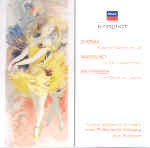One of the most reliable of conductors, Jean Martinon always can be counted on to treat “light” music with the same unfailing musical virtues of sharp rhythms, excellent ensemble balance, and pointed articulation that he brings to the heavy stuff. It’s a pity he didn’t do all of the Slavonic Dances, because this deft and infectiously vivacious account of Op. 46 is about as fine as they come, overflowing with color and energy. The two Furiants that bookend the set are almost overwhelming in their ferocity, but they never turn brutal or sound forced. The same virtues characterize the Massenet and Meyerbeer performances, with the Israel Philharmonic (at this stage–1958–not one of the world’s better orchestras) rising to the occasion under a conductor who obviously cares. Originally issued in Japan, this coupling–certainly not conventional, and for that reason perhaps most appealing to fans of Martinon–makes extremely enjoyable listening. The sonics also come across surprisingly well. Normal folks take note: you’ll really like this.
































